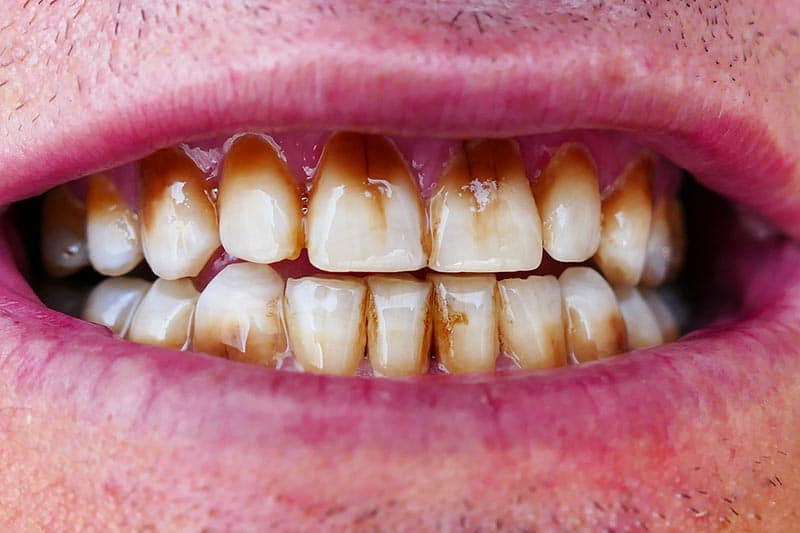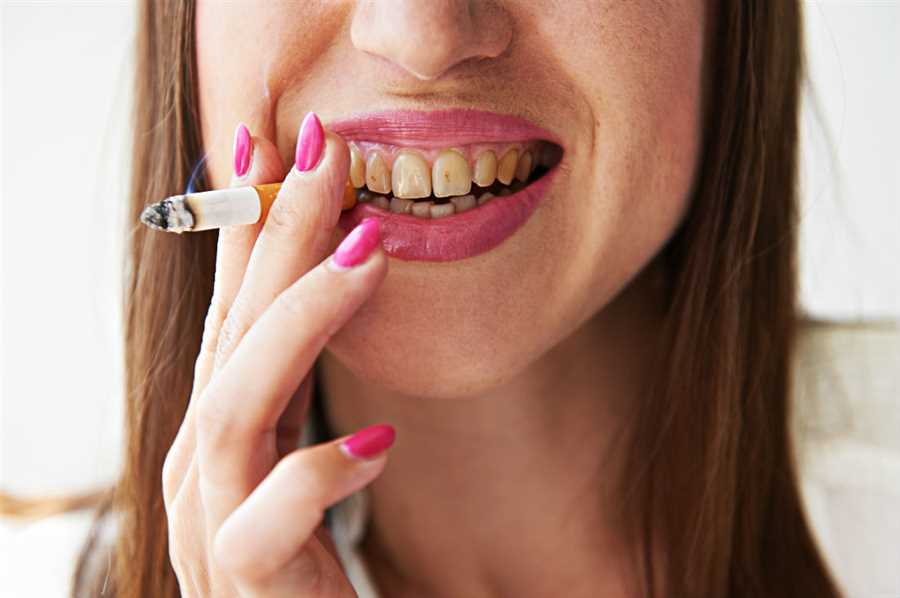The amount of time it takes for smoking to affect your teeth or gums varies due to certain factors such as; the rate at which you smoke, oral hygiene, quality of the cigarette, hydration, diet, etc. At the minimum, it can take about one week to a month of continuous smoking before the effects of the smoke on your teeth and gums start becoming noticeable.
However, smoking starts affecting your teeth, lungs, and heart from the very first day. You only start noticing these effects after a week, or a month depending on the factors mentioned above.
If you want to keep your teeth healthy, it’s a good idea to avoid smoking altogether. Cigarettes contain harsh chemicals that can damage your health and well-being in a variety of ways. You may be fine if you smoke for a week, but are you chain-smoking? (smoking one cigarette after the other?). If you smoke for a few months, you’ll be causing a slew of health issues, including problems with your teeth.
If you’re worried about your teeth, it is better to stop smoking. It’s also the best option for you, your neighbors, and the general public.
Recommended: 5 Best Mouthwash For Cigarette Smokers
Cigarettes are bad for you: they’re addictive, they stink up your clothing, they’re costly (depending on where you live), and they can cause lung cancer (need I say more?).
4 Ways Smoking Affects Your Oral Health
Below are some of the ways smoking affects your teeth and as well as your mouth:
- Creates Plaque and Tartar: Tobacco products contain chemicals that alter saliva flow, making it easier for oral bacteria to adhere to teeth and gums.
- Reduced Gum Healing: Tobacco usage reduces the amount of oxygen in your bloodstream, making it difficult for infected gums to recover. Smoking, sugar, and starch have some relationship with tooth decay.
- Promotes Gum Disease: Gum disease progresses more quickly in smokers than in nonsmokers. Smoking can make the mouth dry, preventing saliva from performing its normal rinsing, diluting, and buffering functions, promoting gum diseases, and making decay more likely.
- Loss Of Tooth: Since nicotine shrinks the blood vessels in the gums (much as it does in the heart), poor circulation is unable to repair the damage caused by the bacteria strains that cause gum disease. This can ultimately lead to tooth loss. Smoking’s byproducts which include natural acids like formic acid, acetic acid, and propionic acid, can cause demineralization. Additionally, nicotine in large doses may cause mild stomach acid reflux, resulting in an acidic oral setting. In adults, gum disease is the most common cause of tooth loss.
Recommended: Quit Smoking Today With These 6 Powerful Steps
How Long Does It Take For The Effects Of Smoking To Disappear From Your Teeth?
How quickly your body recovers from the effects of smoking is determined by how long you’ve been smoking, how much you smoke, the amount you smoke, your genetics, diet, and other factors. However, once you stop, you will see significant improvements within a few weeks, and things will only get better from there, day by day.
Recommended: How To Make Wisdom Teeth Stitches Dissolve Faster: Top Tips
If you’re dealing with tobacco stains, a fast scaling, polishing, and, if necessary, whitening should suffice; all of this can be completed in a dental clinic in a matter of hours.

How Long Should I Wait To Smoke After a Wisdom Tooth Extraction?
Following a tooth extraction, a blood clot forms in the extraction socket, which is responsible for the wound’s healing process. This blood clot is relatively ‘fragile’ for around 24 hours and can be easily dislodged by some sort of negative pressure generated in the mouth, which is normally caused by acts such as drinking from a straw, smoking and rinsing, or spitting too aggressively.
The dislodged clot causes the wound to take longer to heal, which can lead to secondary infection and the development of a Dry Socket, which is a painful condition. Additionally, in cases of affected tooth extraction, the risk of having a Dry Socket increases by 20-30%.
Recommended: Dental Implants: 7 Top Benefits You Must Know
The healing time is significantly reduced if your extraction site was sutured. It does not, however, imply that you disregard the post-extraction directions given by your dentist.
An extraction site usually takes about two weeks to fully recover. If quitting smoking for that long is out of the question, the best option is to smoke gently by taking small, gentle puffs without inhaling the smoke.
However, studies indicate that even when people stop smoking after the extraction, the blood vessel changes caused by smoking prior to the extraction have already occurred, so you should try to quit smoking a few days before the extraction.
Recommended: Invisalign Dental Aligners: Important Things You Must Know First
Conclusion
It can take between one week to a month or even a year, before smoking start affecting your teeth. The amount of time is determined by the rate at which you smoke, oral hygiene, quality of the cigarette, hydration, diet, etc.
Smoking affects your teeth by creating tartar and plaque, reducing gum healing, promoting gum diseases and ultimately causing tooth loss.
It is better to wait for about 2 weeks and above before smoking after a wisdom tooth extraction.
What are your thoughts? please use the comment box below.
